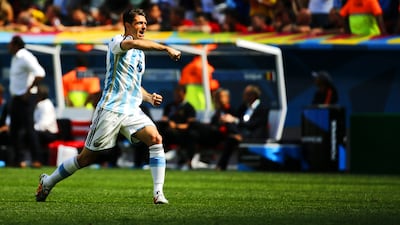He was an object of mockery, a figure of fun, Manuel Pellegrini’s folly.
Go back a few months and the concept of Martin Demichelis proving a first-choice player in a World Cup-winning side seemed utterly improbable, still less the idea his presence in their defence might prove reassuring.
Now he may be only 180 minutes and less than five days from adding the World Cup to the English Premier League and the League Cup in a personal roll of honour.
Strange as it sounds, 2014 could be the year of Demichelis.
Click here to visit The National’s World Cup 2014 landing page
It is a startling turnaround. Manchester City’s Uefa Champions League exit came after Demichelis was sent off and conceded a penalty in their 2-0 loss to Barcelona.
They departed the FA Cup at the hands of Wigan, another match when he gave away a spot kick.
Demichelis was partly culpable for the goal Sunderland scored in the League Cup final, although City recovered to win. It nevertheless prompted suggestions he could complete a personal grand slam by making the blunder that cost them the Premier League title.
Instead, a previously error-prone centre-back discovered a sure touch when it mattered. His fortunes seemed to change the moment Vincent Kompany was sent off in the March trip to Hull City.
Demichelis produced an authoritative display. Weak link was reinvented as a bastion of reliability.
Perhaps only two men could claim they were not surprised: Demichelis himself, who always seems to exude complete confidence in his own abilities, and Pellegrini, who appeared to have an unshakeable faith in the 32-year-old defender he managed at both River Plate and Malaga.
“He is in a very good performance for the moment,” the manager said after Demichelis’ red card against Barcelona. “I don’t think Demichelis made a bad game.”
Pellegrini seemed to be losing the argument, especially when statistics showed that he invariably picked Demichelis against Lionel Messi and the younger Argentine invariably scored.
“He has had a long career, he has had a lot of years playing football for important teams like River Plate, Bayern Munich and Manchester City,” Pellegrini said.
And, indeed, Argentina. But Demichelis was dropped after making a mistake that gifted Bolivia a goal in 2011.
His international exile lasted the best part of three years before he was a surprise choice in Alejandro Sabella’s 30-man provisional squad for the World Cup.
He made the final 23 and, after beginning the tournament on the bench, was promoted to the starting 11 for the quarter-final against Belgium. Argentina, who endured some defensive jitters when Federico Fernandez partnered Ezequiel Garay, coped more comfortably when Demichelis displaced Fernandez.
The trademark ponytail is gone, replaced by something more conventional, but he maintained his end-of-season form.
Perhaps he was a horses-for-courses selection, with Sabella thinking his height would help against Belgium’s battery of giants, Marouane Fellaini, Divock Origi and Romelu Lukaku.
It did.
Netherlands, who rely more on speed and skill in attack, present a very different challenge and have a more-potent forward line.
Besides his occasional rashness, Demichelis’s major shortcoming is a lack of pace, but Robin van Persie may not exploit it.
Arjen Robben, whose scorched-earth style of sprinting has made him one of the World Cup’s most destructive talents, could.
Demichelis played alongside Robben at Bayern Munich, although it may be an exaggeration to say inside knowledge is an advantage.
After all, Robben ran riot against his old Real Madrid colleague, Sergio Ramos, in a 5-1 win over Spain.
The Dutchman presents Demichelis with his stiffest test since he last encountered Messi, now a teammate.
Stop him, should Argentina win and prevail in the final, and it would represent a remarkable renaissance.
A year ago, Demichelis was signed by Atletico Madrid as a reserve.
When he joined City, he was seen as the fourth-choice centre-back and, six months into his career at the Etihad Stadium, he appeared a failure.
Now the transition from ignominy to ecstasy nears completion.
sports@thenational.ae
Follow us on Twitter @SprtNationalUAE


